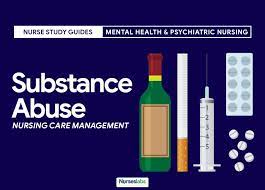Diagnosing Patients with Addictive Disorder. 2022 Best

For this assignment we will focus on assessing and Diagnosing Patients with Addictive Disorder. Many individuals seeking treatment meet the criteria for both mental health and substance-related disorders.
Diagnosing Patients with Addictive Disorder.
Paper details Week 8: Substance-Related and Addictive Disorders. Many individuals seeking treatment meet the criteria for both mental health and substance-related disorders. Regardless of whether you specialize in substance-related disorders, all advanced practice nurses should know their signs and symptoms and how to assess and diagnose them. There are assessment and screening tools available to clinicians, and a plethora of information can be obtained through the diagnostic interview. It takes time and experience to know what types of questions to ask to gain the most information, in addition to a basic knowledge of the substances and behaviors you are trying to assess.
Diagnosing Patients with Addictive Disorder.
It can be complicated to sort out substance use disorders from other mental health disorders, but most clients seeking treatment have comorbidities. This week, you apply DSM-5 substance use and addictive criteria as you formulate a diagnosis for a patient in a case study. Learning Objectives Students will: Apply concepts, theories, and principles related to patient interviewing, diagnostic reasoning, and recording patient information Formulate differential diagnoses using DSM-5 criteria for patients with substance-related and addictive disorders across the lifespan Assignment: Assessing and Diagnosing Patients With Substance-Related and Addictive Disorders An important consideration when working with patients is their cultural background.
Diagnosing Patients with Addictive Disorder.
Understanding an individual’s culture and personal experiences provides insight into who the person is and where he or she may progress in the future. Culture helps to establish a sense of identity, as well as to set values, behaviors, and purpose for individuals within a society. Culture may also contribute to a divide between specific interpretations of cultural behavior and societal norms. What one culture may deem as appropriate another culture may find inappropriate. As a result, it is important for advanced practice nurses to remain aware of cultural considerations and interpretations of behavior for diagnosis, especially with reference to substance-related disorders.
Diagnosing Patients with Addictive Disorder.
At the same time, PMHNPs must balance their professional and legal responsibilities for assessment and diagnosis with such cultural considerations and interpretations. For this Assignment, you will practice assessing and diagnosing a patient in a case study who is experiencing a substance-related or addictive disorder. With this and all cases, remember to consider the patient’s cultural background. To Prepare: Review this week’s Learning Resources and consider the insights they provide. Review the Comprehensive Psychiatric Evaluation template, which you will use to complete this Assignment. https://youtu.be/1FiGaR6XM2c
Diagnosing Patients with Addictive Disorder.
By Day 1 of this week, select a specific video case study to use for this Assignment from the Video Case Selections choices in the Learning Resources. View your assigned video case and review the additional data for the case in the “Case History Reports” document, keeping the requirements of the evaluation template in mind. Consider what history would be necessary to collect from this patient. Consider what interview questions you would need to ask this patient. Identify at least three possible differential diagnoses for the patient. By Day 7 of Week 8 Complete and submit your Comprehensive Psychiatric Evaluation, including your differential diagnosis and critical-thinking process to formulate a primary diagnosis.
Additional Files







